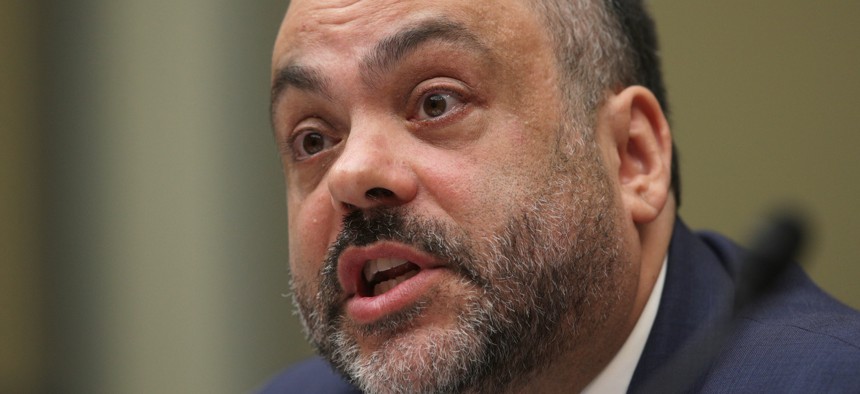
Merit Systems Protection Board nominee Henry Kerner, pictured at 2019 hearing, testified before the Senate Homeland Security and Governmental Affairs Committee Thursday. Alex Wong / Getty Images
Senate takes first steps to refill federal workforce watchdog roles
At the civil service appeals agency, parts of the workforce are voicing frustration with current leadership.
President Biden’s nominees to serve in key leadership roles overseeing civil service protections pledged during a confirmation hearing on Thursday to lean on their vast executive branch experience in defending federal whistleblowers and the rest of the workforce.
Henry Kerner, whose term leading the Office of Special Counsel recently expired, who would serve in the third and final slot of the central panel on the Merit Systems Protection Board, the quasi-judicial agency that hears federal employees’ appeals of adverse actions, pointed to his record at his former agency in support of his credentials.
He noted to the Senate Homeland Security and Governmental Affairs Committee that he had overseen a record number of favorable actions for whistleblowers at OSC, which in 2022 sat 20% above their five-year average, and the high-profile Hatch Act enforcement cases he oversaw during both the Trump and Biden administrations.
Originally a President Trump appointee, Kerner, who has also worked under former Rep. Jason Chaffetz, R-Utah, and former Sen. John McCain, R-Ariz., would fill the vacant Republican slot on the board after it was vacated by Tristan Leavitt. He would join Cathy Harris, the board’s acting chair, and Ray Limon on the panel, who helped reconstitute the agency after operating without a quorum for five years. That led to a backlog of 3,800 cases pending before MSPB’s central panel, which the members have since reduced by 50% to 1,900.
Kerner noted he previously dealt with a significant backlog at OSC, which he helped reduce by 1,000 cases. The nominee, who was approved for his OSC role in 2017 in a unanimous voice vote, said he would bring that experience to MSPB.
“I think one thing that's really prepared me at OSC very well for this role is I've always had a very robust discussion and open discussion process and people were able to to express their views freely,” Kerner said. “So I've kind of been a little bit in the judicial role already because I would get opinions from various people and then had to make a call based on that.”
If confirmed, Kerner would offer additional leadership to MSPB at what appears to be a welcome time for the agency. In the most recent Federal Employees Viewpoint Survey, just 49% of employees said they were satisfied with the organization, down 17 percentage points from 2022. Less than 40% said they had confidence in senior leadership. The agency recently paused decision issuance for five weeks due to an IT modernization initiative.
The MSPB Professional Association, represented by the International Federation of Professional and Technical Engineers, is also pushing for a new contract with the agency, accusing management of dragging its feet for the last year of negotiations. The two sides have brought in the Federal Mediation and Conciliation Service to resolve their differences, but have so far agreed to just eight of the 40 articles in their collective bargaining agreement.
Of particular concern to IFPTE, MSPB management is challenging that its administrative judges who make initial rulings on federal employee appeals have “decisional independence.” The union said the agency must concede that point to ensure the judges can “perform their duties in a manner that ensures due process.”
“Ultimately, we raise these concerns because management’s aversion to engaging in productive and interest-based bargaining and to resolving issues collaboratively and proactively with the union is having a measurable effect on lowering the morale of the agency workforce and resulting in attrition of the agency’s AJ corps,” IFPTE said in letters to the leadership of HSGAC and the House Oversight and Accountability Committee.
The union asked the lawmakers to ensure MSPB’s judges can carry out their work without inference on independent adjudication.
William Spencer, MSPB’s executive director, said the agency has been bargaining in good faith with the union, but added it would be inappropriate to comment further on those discussions given the confidentiality of the talks.
Biden nominated Hampton Dellinger to serve as Kerner’s replacement at OSC. He previously won Senate confirmation—in a mostly party-line vote, though he earned support from a handful of Republicans—to serve as assistant attorney general for the Justice Department’s Office of Legal Policy. Dellinger vowed to protect anyone who shines a light on government misconduct, noting they often “find themselves in professional peril.”
“If confirmed, I will take every complaint made to OSC seriously, every single one, and my overriding goal will be to contribute to greater trust in government, including by protecting whistleblowers vigorously,” Dellinger said.
The hearing did not garner significant interest from committee members, with just three senators attending to ask questions of the nominees. Sen. Josh Hawley, R-Mo., was the lone Republican at the hearing.







